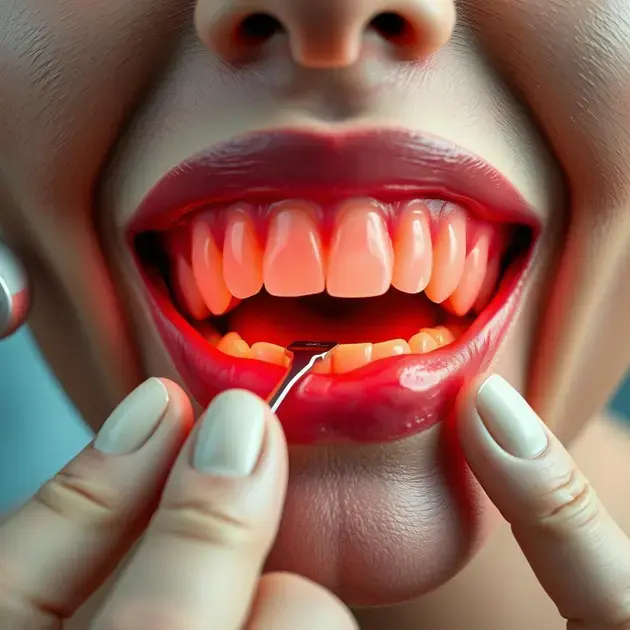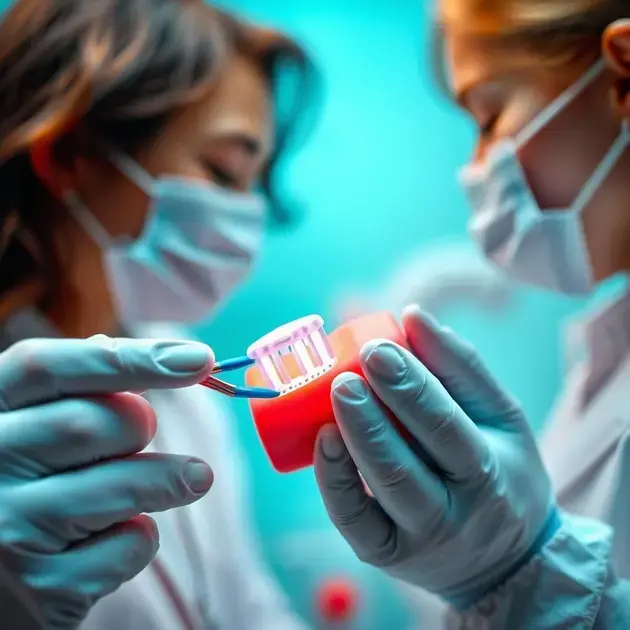When it comes to maintaining your oral health, understanding and managing gingivitis is crucial. “Gingivitis Treatment: Your Complete Guide to Preventing and Treating Gum Disease” explores the essential steps and practices to keep your gums healthy. With a focus on prevention and early intervention, this guide provides actionable advice supported by the latest dental research.
Recent studies have shown that approximately 47.2% of adults aged 30 and older have some form of periodontal disease, with gingivitis being the most common. Preventing this condition involves regular dental check-ups, proper brushing techniques, and the right dietary choices. In the following sections, we will dive deeper into how you can integrate these practices effectively into your daily routine to fight gingivitis.

Effective Prevention Strategies
Gingivitis is a common dental issue that can lead to more serious problems if left untreated. However, there are several effective prevention strategies that can help maintain good oral health and prevent gingivitis from developing.
1. Brush and Floss Regularly
One of the most important prevention strategies for gingivitis is to brush your teeth at least twice a day and floss daily. This helps remove plaque and bacteria that can contribute to gum disease. Use a fluoride toothpaste and a soft-bristled toothbrush for best results.
2. Use Antiseptic Mouthwash
In addition to brushing and flossing, using an antiseptic mouthwash can help reduce bacteria in the mouth and prevent gingivitis. Look for a mouthwash that is specifically designed to fight plaque and gingivitis.
3. Maintain a Healthy Diet
Eating a balanced diet rich in fruits, vegetables, and whole grains can help support good oral health and prevent gingivitis. Avoid sugary and acidic foods, as they can contribute to plaque buildup and gum disease.
4. Visit Your Dentist Regularly
Scheduling regular dental check-ups and cleanings is essential for preventing gingivitis. Your dentist can detect early signs of gum disease and provide treatment to keep your gums healthy.
5. Quit Smoking
Smoking is a major risk factor for gum disease and can make it harder to prevent and treat gingivitis. If you smoke, consider quitting to improve your oral health and reduce your risk of developing gum disease.
Understanding the Causes of Gingivitis
Gingivitis is typically caused by poor oral hygiene that allows plaque to build up on the teeth and gums. Understanding the specific causes of gingivitis can help you take steps to prevent and treat the condition.
1. Plaque Buildup
Plaque is a sticky film of bacteria that forms on the teeth when sugars and starches in food interact with bacteria in the mouth. If plaque is not removed through brushing and flossing, it can irritate the gums and lead to gingivitis.
2. Hormonal Changes
Hormonal changes, such as those during pregnancy or puberty, can increase the risk of developing gingivitis. These hormonal shifts can make the gums more sensitive to plaque and bacteria, leading to inflammation and gum disease.
3. Medications
Some medications, such as certain anticonvulsants and anti-angina drugs, can cause gum tissue overgrowth, making it easier for plaque to accumulate and increasing the risk of gingivitis. It’s important to discuss any potential side effects with your healthcare provider.
4. Poor Nutrition
A diet lacking in essential nutrients, such as vitamin C, can weaken the immune system and make it harder for the body to fight off gum infections. Eating a healthy diet can help support gum health and prevent gingivitis.
5. Genetics
Some individuals may be more genetically predisposed to gum disease, making them more susceptible to gingivitis even with good oral hygiene practices. Knowing your family history can help you take steps to prevent gum disease.
Implementing Healthy Dental Habits
Developing healthy dental habits is crucial for preventing gingivitis and maintaining good oral health. By following a few simple steps, you can ensure that your teeth and gums stay healthy for years to come.
1. Establish a Routine
Creating a daily dental hygiene routine is key to preventing gingivitis. Make sure to brush your teeth at least twice a day, floss daily, and use mouthwash to remove bacteria and plaque from the mouth.
2. Drink Plenty of Water
Drinking water helps rinse away food particles and bacteria that can contribute to gum disease. Aim to drink water throughout the day, especially after meals, to maintain good oral health.
3. Limit Sugary Foods and Beverages
Sugary foods and drinks can feed the bacteria in your mouth, leading to plaque buildup and gum disease. Try to limit your consumption of sugary treats and opt for healthier alternatives like fruits and vegetables.
4. Use Fluoride Products
Fluoride toothpaste and mouthwash can help strengthen tooth enamel and prevent tooth decay, which can contribute to gum disease. Look for dental products that contain fluoride to support your oral health.
5. Seek Professional Care
In addition to practicing good oral hygiene at home, it’s important to visit your dentist regularly for check-ups and cleanings. Your dentist can help detect and treat early signs of gum disease before it progresses. Schedule an appointment at least twice a year for optimal oral health.

Preventing Gum Disease Through Proper Oral Hygiene
When it comes to preventing gum disease, maintaining proper oral hygiene is essential. Brushing your teeth at least twice a day and flossing daily can help remove plaque and bacteria that can lead to gum disease. Using an antimicrobial mouthwash can also be beneficial in reducing bacteria in the mouth.
Another important aspect of proper oral hygiene is regular visits to the dentist. Professional cleanings can remove plaque and tartar buildup that cannot be effectively removed at home. Your dentist can also identify early signs of gum disease and provide treatment before it progresses.
It is also important to watch your diet when aiming to prevent gum disease. Avoiding sugary and starchy foods can help reduce the risk of plaque buildup, which can lead to gum inflammation. Drinking plenty of water and eating a balanced diet rich in fruits and vegetables can also support gum health.
Finally, incorporating good oral habits into your daily routine, such as using a soft-bristled toothbrush and replacing it every three to four months, can further prevent gum disease. Being consistent with your oral hygiene practices can go a long way in maintaining healthy gums.
The Link Between Diet and Gingivitis
There is a strong link between diet and gingivitis, as what you eat can directly impact the health of your gums. Consuming a diet high in sugary and acidic foods can contribute to plaque buildup and increase the risk of gingivitis. On the other hand, a diet rich in vitamins and minerals, such as vitamin C and calcium, can help support gum health.
One food that has been linked to gingivitis is red wine, particularly the more expensive varieties. While red wine contains antioxidants that can benefit overall health, it can also stain teeth and contribute to gum inflammation if consumed in excess. It is important to enjoy red wine in moderation and practice good oral hygiene to prevent gingivitis.
In addition to watching your diet, maintaining proper oral hygiene habits is crucial in preventing gingivitis. Brushing and flossing regularly, using an antimicrobial mouthwash, and scheduling regular dental check-ups can help keep your gums healthy and reduce the risk of gingivitis.
Overall, being mindful of your dietary choices and taking care of your oral health can help prevent gingivitis and promote overall gum health. By making small changes to your diet and daily oral care routine, you can reduce the risk of gum disease and maintain a healthy smile.
The Role of Regular Dental Check-Ups in Gum Disease Prevention
Scheduling regular dental check-ups plays a crucial role in gum disease prevention. During a dental visit, your dentist will not only clean your teeth and remove plaque and tartar but also examine your gums for any signs of disease or inflammation. Early detection of gum disease can lead to prompt treatment and better outcomes.
Regular dental check-ups also provide an opportunity for your dentist to educate you on proper oral hygiene practices. Your dentist can offer personalized recommendations for brushing and flossing techniques, as well as suggest products that may benefit your dental health, such as an electric toothbrush or a specific mouthwash.
Furthermore, dental check-ups allow for the monitoring of any changes in your oral health over time. By tracking the condition of your gums and teeth during regular visits, your dentist can identify any concerning developments and address them before they progress into more serious issues.
Overall, making regular dental check-ups a priority can help prevent gum disease and maintain optimal oral health. By partnering with your dentist and staying proactive about your dental care, you can enjoy a healthy smile for years to come.
conclusão
Proper oral hygiene is the cornerstone in preventing gum disease. Regularly brushing your teeth, flossing daily, and using antimicrobial mouthwash are essential habits to remove plaque and bacteria that contribute to gum issues. Additionally, scheduling routine dental visits is vital for professional cleanings and early detection of gum disease signs, ensuring timely treatment.
The interconnection between diet and gingivitis underscores the significance of dietary choices in maintaining gum health. Avoiding sugary and acidic foods while incorporating vitamins and minerals like vitamin C and calcium can support gum health. Moderation in consuming red wine, known to exacerbate gum inflammation, is crucial along with maintaining proper oral hygiene practices to prevent gingivitis.
Emphasizing regular dental check-ups is pivotal as it allows for comprehensive oral health monitoring. Dentists can clean teeth, inspect gums for any disease indicators, and provide personalized guidance on effective oral hygiene techniques. By prioritizing these check-ups, it becomes easier to prevent gum disease, ensuring lasting oral health and a vibrant smile for the future.
